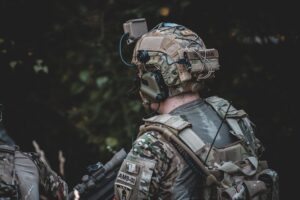By Barry Keate
Barry Keate, has lived with tinnitus over 40 years and has published 150+ research articles on numerous aspects of tinnitus. He is an expert on the condition and a well-known advocate for those with tinnitus.
 (Daniel/unsplash)
(Daniel/unsplash)
Our men and women in the military face many dangers that could potentially alter their lives and even end their careers. They willingly face the possibility of experiencing life-altering experiences daily. However, one common disability is avoidable with a bit of planning.
Hearing loss and ear damage may come suddenly and unavoidably if someone is in range of an explosive device. But hearing loss from target practice, being around heavy machinery regularly, and working with power tools shouldn’t be a health hazard with the number of hearing protection options available.
Why Military Personnel Might Avoid Hearing Protection
Despite several options for hearing protection and tinnitus being the number one claimed disability for the military, some people still resist protecting their hearing. Why?
- Delayed Symptoms– The most common reason for some may not use ear protection when they should is that they don’t feel like they need it. Damage happens gradually and goes unnoticed until it interferes with daily tasks. By then, the damage may be permanent.
- Tactical Disadvantage– Others might worry that they will miss some sound alerting them to an enemy presence, jeopardizing them and their unit.
- Too Much Trouble– Some might believe that one shot or explosion won’t hurt; it’ll just be a second. It’ll be over before I find the earplugs. Unfortunately, those seconds add up over a career.
- Missing Commands– Some fear they won’t hear their commanding officer issue a command and face unwanted consequences.
What Types Of Hearing Protection Products Are Available?
Foam Ear Plugs
These handy little plugs are tiny, cheap, and generally used for a single project or event before you throw them away. You can keep a package of them handy anywhere you’re likely to run into noisy situations.
To insert them, pinch and roll them between your thumb and forefinger till it’s compacted and smooth. Straighten the ear canal by reaching over your head to grab the earlobe on the opposite side and pulling gently. Insert the compacted foam into the canal as far as possible and release it. The foam will expand to fill the ear canal. One size fits all.
Triple/Quadruple Flange Ear Plugs
These need to be fitted by your doctor to verify you have the correct size. They block out all types of sounds and make communication difficult. They are meant for constant noise, like working in an engine room or on the deck of an aircraft carrier.
Straighten the ear canal as described above, then insert the plugs until the outer flange is in the ear canal. It should make an airtight seal. Remove them by twisting them slowly to break the seal before pulling them out. They are reusable and should be inspected by your doctor once a year to ensure they still fit properly.
Tactical Earplugs
These handy devices are adjustable. One setting blocks out steady noise, while another stops sudden loud noises like gunfire, allowing you to hear everything else. This feature is especially useful as it allows a unit to communicate effectively, and military personnel are still aware of their surroundings.
Tactical plugs must be fitted by a professional and inspected annually to ensure they are still functioning. Insert the same way you would a flange ear plug.
Noise Muffs
Like over-ear headphones, a padded form closes over the outside of the ear, attached by a headband. They are adjustable to fit various head sizes and available in sports and hardware stores. They muffle everything but are easy to remove if you need to communicate. An airtight seal is necessary for these to be effective, so the ear cups should fit snugly around the ear and hold their position while you work.
Tactical Communication and Protective Systems (TCAPS)
The TCAPS mixes a tactical earplug and a hearing aid. It protects you from sudden or continuous loud sounds by reducing the decibels to healthy levels. You still hear sound and know what direction it came from, but it doesn’t cause harm.
If you need to enhance your hearing, when checking to see if it’s safe to move on, you can turn up the volume to hear softer sounds that might go unnoticed. It also has multiple charging options for varying environments. A doctor must fit you for TCAPS and inspect them regularly.
What Happens If You Get Tinnitus From Loud Noise?
First, verify with your doctor that there isn’t another underlying medical cause for your condition. While you’re seeking a diagnosis and pursuing treatment, there are products for tinnitus that lessen symptoms. Alternative treatments for tinnitus can include correcting nutritional deficiencies and adding supplements that lower inflammation and improve neural connectivity and cellular regeneration.
The Takeaway
Whatever branch of the military you may serve in, whatever your job, there is ear protection that will allow you to fulfill your duty to your country at peak levels while still protecting your hearing and safeguarding your quality of life down the road. Take precautions now to avoid hearing loss and the detrimental effects tinnitus can have on your everyday life.
Get Free Shipping!
Order now and get free shipping on either the Tinnitus Starter Kit or Combo Pack. Try the doctor recommended products with clinically proven ingredients for tinnitus. No coupon code required.

